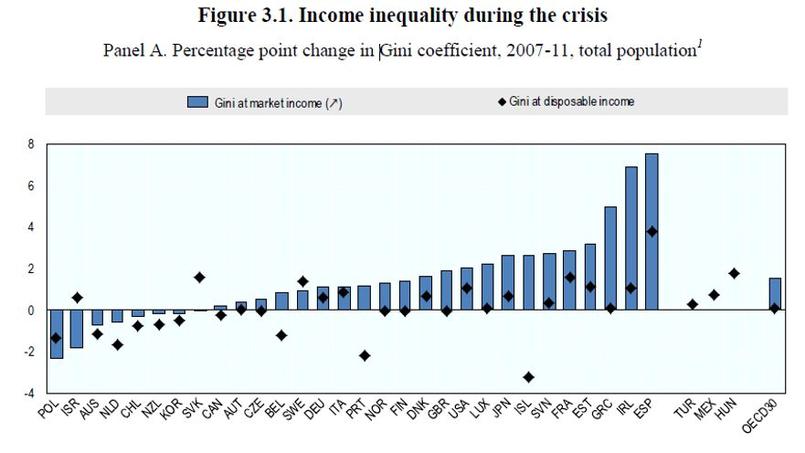THE ECO SCAN – The rise of precarious employment, which puts pressure on wages, exacerbated the gap between the wealthiest and poorest households between 2007 and 2011, according to a report by the OECD published Thursday. Women are particularly vulnerable.
Who suffered most from the crisis in France? Between 2007 and 2011, inequality has risen more significantly in France than in other OECD countries, according to the report “All concerned, Why less inequality benefits everyone” published by the organization on Thursday . The Gini coefficient * of France, which measures the differences in wealth and income between individuals, increased from .293 to .309 over that period. “This is a significant departure from the long-term trend, as since the 1980s, inequalities were relatively stable in France, while they were increasing in a number of countries, such as Germany or the United States, “the authors report. In 2013, the situation has improved slightly as the index fell to 0,306. Inequalities in France are close to the OECD average.
Specifically, during the crisis, inequality in terms of “revenue merchants,” that is to say, before taxes and social benefits, rose 2.9%. This is the fifth largest increase among the 36 OECD countries. France is ranked not far behind the leading trio – Spain, Ireland and Greece hit hard by the crisis – and just after Estonia. The redistribution system to the French, particularly social benefits increases deployed since 2009, have mitigated this increase. The result in terms of disposable income, inequality rose 1.6%. La France is always in the top 5 of the largest increases, far behind Spain, but in a handkerchief with Sweden (which has trimmed its allowances and other benefits), Slovakia and Hungary.

Inequality of merchants and disposable incomes have widened faster in France than in most other countries OECD. . Credit: OECD
“The 10% of people with the lowest incomes have suffered more severely the crisis”, says the OECD. Their income fell 1% per year on average. Conversely, 10% of people with the highest incomes saw their income increase by 2% per year on average between 2007 and 2011. Either a rate twice as fast as in the entire OECD ( + 1%).
What explains this gap? “The inequality of primary income, the main source is labor income, increased (…) more under the pressure of wages than of rising unemployment,” replies the organization. The labor market was completely redesigned during the crisis, with the emergence of “non-standard jobs,” that is to say, temporary contracts, part-time and self-employed. A third of the employed population in France was in one of those situations in 2013, according to the report. These people, says the OECD, “are penalized in terms of pay compared to individuals with employment standards.” A temporary worker earns, for example, 40% less on average per year that a worker full time permanent contracts.
The non-standard employment, particularly temporary employment, has the distinction of being in France less often a stepping stone to a standard job
And the opportunity to get out of this form of precariousness is quite restricted. “The non-standard employment, particularly temporary employment, has the distinction of being in France less often a stepping stone to a standard job.” Thus, 20% of employees in temporary or fixed-term contracts in 2008 had evolved into a job CDI in 2011. A rate that reached 30% in Austria and 48% in Britain.
In addition to the precarious workers, women particularly suffer from these inequalities. First, because they occupy the vast majority (63%) of those famous non-standard jobs. The average is more balanced in the OECD: 55% women to 45% men. The contingent of these workers in France is younger, 46% are aged 15 to 29 years. “The wage gap between women and men has not reduced in France since 2000,” the report also notes. Women earn 14% less than men in France. A difference much more obvious than in Norway (7%), Denmark (8%), Spain (9%) and Italy (11%). France can nevertheless rejoice to do better than Germany (17%) on this point.
* The Gini coefficient is 0 in the case of perfect equality (everyone has the same income) and 1 in a position of extreme inequality (one person has all the income, other n ‘nothing).
No comments:
Post a Comment